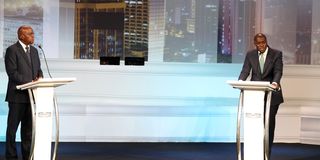Live debates a great chance to evaluate election candidates

Nairobi gubernatorial candidates Polycarp Igathe of Jubilee party and Johnson Sakaja of UDA party during second tier of the Nairobi Gubernatorial Debate held at Catholic university of Eastern Africa (CUEA) on July 11, 2022.
One of the most common political presentation frameworks is inviting candidates for a televised live debate. In this event, moderators – mostly senior journalists – host those vying for a seat on a stage.
The session is presented live to the public on radio, television and online. The hosts, usually a pair with an audience at the venue, field tough questions on character, political record and agenda, among others.
Public debate is an excellent opportunity to evaluate political personalities seeking leadership posts, for many reasons.
Firstly, it is one of the only times before the vote that people get to see the politician in action subject to the rules of someone else – in this case the debate organisers. During campaign rallies, the politician is usually the guest of honour, lauded by entertainers, dancing to amuse the crowd, and introduced to the public by countless supporters.
However, at the debate, they are presented neutrally without any showmanship.
It is important to see how they behave when given someone else’s rules of engagement. Do they keep giving time or ask for exemptions? Are they able to follow instructions without complaining? This tells us a little about their own relationship with power when they are not at the centre of it.
Tough questions
The second thing to evaluate is the answers they give. Hosts ask questions that can be tough and uncomfortable. The politicians have to answer them comprehensively and well.
It is, therefore, important for the public to note how much time is spent actually answering these questions, and the substance of what is said. Do they see themselves as a one-person army who will miraculously defeat ills that have faced Kenya for decades, or are they taking a more grounded and collaborative view? What goals are they aiming for and why? How do they foresee working with critics and naysayers? All these are important things to look out for.
The third thing to look out for is how they answer questions. Most politicians and famous people undergo media training, where they are trained on how to field questions, including dodging tough ones that they don’t like, and how to behave when the questioner annoys them.
The hosts know this, and so the debate is choreographed to see how the politician behaves under pressure, especially when angry and irritated. Is their first instinct to be insulting or to issue threats, or are they able to keep their cool when baited either by the host or their opponent? How the politicians respond to perceived insults is just as important.
Debates are public interviews that allow the public to evaluate the prospective candidates who will be working in their name and that of the country.
It is, therefore, necessary for Kenyans to watch them carefully so that they can see beyond the carefully curated personas of rallies and manifestos. This will help them to vote wisely when the time comes.
The writer is a policy analyst. [email protected]





